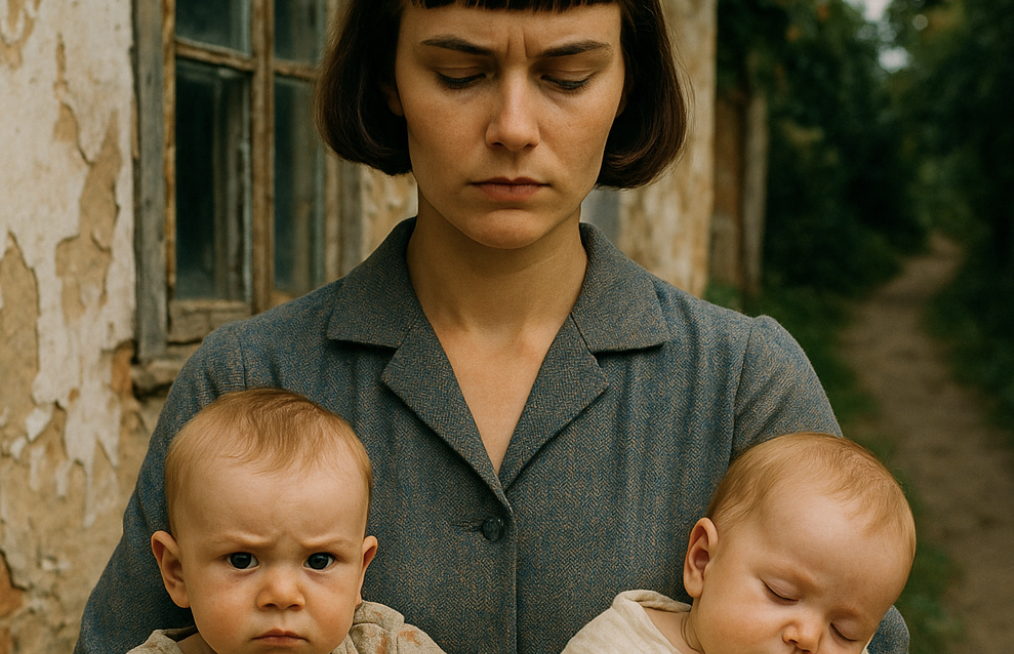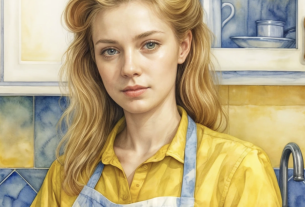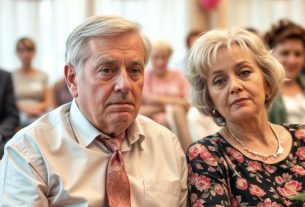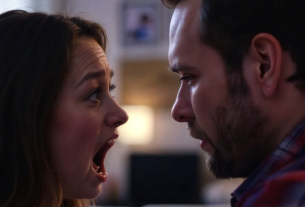Do you believe in miracles, Maria?” Fyodor sat down on the porch step, wiping sweat from his forehead. “In the idea that heaven might answer your prayers?”
“I believe in hard work and persistence,” Maria replied, touching his shoulder, then froze, squinting toward the far end of the dusty road. “Look over there…”
The July heat hung in the air like molten glass. The village seemed deserted under the burning sun.
Through the shimmering haze, two small figures appeared, slowly approaching their home. Fyodor squinted, shielding his eyes with his hand. Children. Two boys, holding hands, stumbled along the road as if worn out from a long journey.
“Whose kids are those?” Fyodor rose. “I’ve never seen them before.”
Maria was already hurrying toward the gate. Something stirred inside her — like a fine string, stretched tight by years of longing for children they never had.
The boys stopped when they saw the adults. Both were equally thin, their gazes equally lost. One was slightly taller, and the other clutched an old rag doll to his chest.
“Whose boys are you? Are you lost?” Maria crouched down to their level.
The taller boy said nothing, staring through her. The smaller one tried to speak, but only a faint sound came out, his eyes darting around like a frightened animal’s.
“They’re special,” Fyodor said softly, stepping closer. “Look at how they see the world.”
The boys’ clothes were dirty and torn in several places. One had a dried scratch on his cheek. They looked like abandoned puppies left to fend for themselves.
“Are you thirsty?” Maria asked.
The boy with the toy nodded and suddenly smiled — a bright, heart-melting smile, like sunlight breaking through storm clouds. Maria took his hand. His palm was hot and dry.
“Come inside, it’s cooler in there.”
Fyodor frowned but said nothing, letting his wife lead the children inside. The house smelled of fresh bread and herbs. The boys inhaled deeply, and the one with the toy smiled again.
“Petya,” he said suddenly, pointing to himself.
“And you?” Maria asked the other boy.
“Vanya,” he whispered almost inaudibly.
Fyodor and Maria exchanged a glance. There was something unusual about these children — in their eyes, their voices, their movements.
At the table, the boys drank kvass greedily, letting it drip down their chins. Maria cut thick slices of fresh bread and spread them with butter. They ate slowly, awkwardly holding the pieces.
“Where are you from? Where are your parents?” Fyodor asked once the boys had eaten a little.
Petya shook his head, and Vanya stared down at the table.
“We don’t know,” Petya finally said. “They brought us here.”
“Who brought you?”
“A man,” Vanya said. “He told us to wait here.”
Maria pressed a hand to her chest. Her heart clenched with the realization — they had been abandoned. Left in a strange village where no one knew them, right next to their home.
“How long have you been here?” she asked gently.
“Two suns,” Petya said, pointing at the window.
“Two days?” Maria gasped. “Where did you sleep?”
“There,” Vanya pointed toward the old shed.
Fyodor turned to the window, exhaling heavily, his calloused hands clenching into fists. Maria saw the tension in his shoulders.
“We need to tell the village council,” he said. “We have to find whoever left them.”
Maria moved closer to the boys. Their eyes — both golden-brown with flecks of light — looked at her with a mix of trust and fear.
“You’ll stay with us until we find your family,” she said. “Don’t be afraid.”
That evening, after the boys fell asleep in the old guest room, Fyodor and Maria sat on the porch. The night sky sparkled with stars, like sugar scattered across velvet.
“What do we do now?” Fyodor asked. “They didn’t just end up here by accident. Someone brought them to our house on purpose.”
“Because they knew we wouldn’t turn them away,” Maria said, gazing at the stars. “Maybe this is the miracle you asked about this morning.”
Fyodor said nothing, but he found her hand and squeezed it tightly.
Time flowed like the river behind their house — sometimes rushing over rocks, sometimes slowing in deep pools. The boys stayed.
At first, the village council insisted the boys be sent to an orphanage, but an old friend of Fyodor’s helped them get legal guardianship.
“It’s like someone up there heard us,” Maria once said, watching Petya and Vanya feeding chickens in the yard. “We waited so long, and now they’re here.”
Petya grew up quiet and thoughtful. He could watch clouds for hours or talk to the flowers in the garden. School was hard for him — letters blurred together, numbers slipped from his memory. But every melody he ever heard stayed with him, and he could replay it exactly.
Vanya was physically stronger but struggled to understand jokes or metaphors. Yet he had a special gift with animals — even the wild bull that scared the herders stood calmly when Vanya scratched him behind the horns.
Fyodor taught the boys how to work the land, starting with simple tasks in the garden and eventually trusting them with livestock and haymaking.
“They’re not like everyone else,” he would tell Maria at night, “but they’re ours. You understand? Ours.”
At first, the villagers kept their distance. The kids teased them, the adults whispered. But over time, they became part of the fabric of the village — like a birthmark you first notice, then forget.
When Fyodor decided to buy abandoned fields and expand the farm, people shook their heads.
“What can you do with helpers like that?” they said. “They can’t even hammer a nail straight.”
But Fyodor just squinted into the distance, seeing something others couldn’t.
Fifteen years later, wheat waved where wastelands once lay, and pedigreed cows lowed in new barns. The farm thrived. Fyodor hired workers, built new buildings, expanded the land.
By their twenties, Petya and Vanya were an indispensable part of the farm. Vanya worked with the animals, understanding each one instinctively. He could sense illness before it showed.
“They tell me everything,” he explained to Maria.
Petya found his calling with the beehives they had started on an agronomist’s advice. Bees never stung him. He would sit by the hives without a net, listening.
“They sing to me, Mama,” he would say. “Each bee has its own voice, its own song.”
Maria learned to accept them as they were.
But time brought troubles. Petya’s health worsened. Migraines struck him down; sometimes he couldn’t get out of bed.
“He needs a good doctor,” Fyodor insisted.
Tests confirmed their fears: it was a serious, incurable disease.
“How old is he?” the young doctor asked, not looking up from the charts.
“Thirty,” Maria answered, her lips numb.
“Living to twenty with this condition is a miracle,” the doctor said. “We’ll do everything we can.”
Vanya didn’t fully understand. He saw his brother grow weaker, saw his mother cry at night, saw his father grow even quieter — but he couldn’t piece it all together.
“Petya will get up soon, right?” he asked each morning. “We promised to show him the new calves.”
And Maria nodded, fighting back tears.
Fyodor buried himself in work, returning only at night to sit by Petya’s bed, watching the son he had raised with such love.
“Don’t be afraid, son,” he would whisper when he thought no one heard. “We’ll get through this.”
One autumn day, sunlight streamed through the hospital windows, painting light patterns on the white walls.
Maria sat by Petya’s bed, holding his frail hand.
In his hand rested the same faded rag doll he had clutched when he first appeared at their doorstep twenty-five years ago.
His eyes opened — clear and colorless now, like a dawn lake.
“Mama,” he whispered, “do you remember our bees?”
“Of course, sweetheart,” she whispered back. “They miss you.”
“I miss them too,” his lips curved in a faint smile. “They used to sing me songs — sometimes sad, sometimes happy.”
Tears streamed down Maria’s cheeks.
“Don’t cry,” Petya squeezed her fingers weakly. “I was happy. I had you. And Papa. And Vanya.”
Footsteps sounded in the hall — Fyodor. He came every day after work, bringing the smell of fields and rain, a whiff of life into the sterile hospital.
“How’s our strongman?” Fyodor asked, his voice shaking.
“Papa told me about the new red tractor,” Petya said suddenly.
Fyodor froze. He hadn’t said a word about it aloud.
“Yes, son,” he replied, after a pause. “The best tractor. It’ll be here in spring.”
That night, Petya slipped away — quietly, as if not wanting to wake them.
The day of the funeral was clear, just like the day they had found him. As if time had made a full circle.
Vanya didn’t cry. He stood still, holding the old toy, whispering something only he and Petya could hear.
Fyodor seemed to age ten years overnight. His back bent, his hair turned whiter.
But each morning he rose before dawn and went to work.
Maria stayed strong for Vanya, who now needed her more than ever.
“Petya went to the bees,” Vanya said one morning over breakfast. “He’s helping them make honey now.”
Maria flinched but smiled.
“Yes, son. I believe he is.”
Time dulled the sharp pain. Vanya grew, matured. At forty, he was still innocent and pure, but his eyes had a deeper wisdom.
The farm flourished. Fyodor expanded operations even at sixty. Vanya became his tireless, attentive right hand.
At sunset, they had a tradition: they would sit on the porch — Fyodor on his old stool, Maria on the railing, Vanya on the steps — watching the sky turn gold, then copper, then deep pomegranate.
Simple words would fill the air, about new livestock, a broken combine, or the first honey harvest.
And when silence fell, Petya’s name would echo between them — not in pain, but like the gentle ring of a distant bell.
One evening, Maria came outside and paused.
Vanya sat leaning forward, gazing far into the fields. His profile — the stubborn chin, the upturned nose — reminded her so much of Petya that her heart skipped a beat.
“What are you looking at, dear?” she asked, touching his shoulder.
Vanya turned, smiling, fine lines radiating from his bright, clear eyes.
“Thinking how lucky we were that you found us,” he said simply. “Petya thinks so too.”
Maria hugged him tightly.
Fyodor followed, leaning on his cane. His joints ached, but his gaze was still sharp, still full of dreams.
“Such a blessing,” he said, breathing in the sweet, heavy air. “It feels like we did everything right.”
Maria looked out at their land — the orchard, the pond — their world, built from nothing, sustained by sweat, sometimes by tears.
“You know, Fedya,” she said quietly, “I truly believe in miracles now.”
“What kind of miracles?” he asked, sitting beside her.
“The ones that come barefoot down a dusty road and stay forever,” she replied, taking his hand. “The ones that teach us to love, no matter what.”
Vanya suddenly lifted his head, smiling.
“Petya’s waving at us,” he said.
Fyodor and Maria exchanged a glance. In each other’s eyes, they found the answer: they saw him too — not with their eyes, but with their hearts.
Where the most precious memories live.
Where both their sons would always remain — one by their side, the other in their eternal love.



